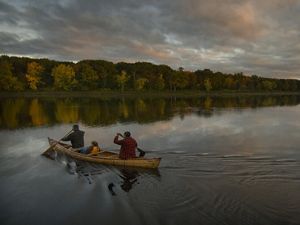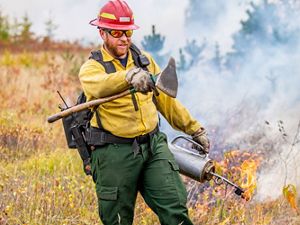An Island Returns
How TNC Maine’s first land return experience is strengthening partnerships and conservation outcomes.
Kuwesuwi Monihq (Pine Island) is the largest island in Qonusakonakom (Big Lake) in the far eastern portion of the place we now call Maine. For time immemorial this place has had, and continues to have cultural significance to the Passamaquoddy Tribe. In a 1794 treaty with Massachusetts, the island was included in the Tribe’s Motahkomikuk reservation. But sometime in the early to mid-1800s colonizers changed the name to White’s Island on maps. Suddenly, it no longer matched the name in the treaty, and just like that, Kuwesuwi Monihq was stolen and sold. Different versions of this story played out again and again in the region until Wabanaki People were left with less than 2% of their ancestral lands.
While conservation organizations have worked to conserve and steward Maine’s natural places, in some ways the traditional approach to conservation has exacerbated the exclusion of Indigenous Peoples from their homelands. In recent years, however, a movement has gained strength among Maine conservation organizations to learn the true, complicated history of colonialism in this region, to grapple with conservation’s role in it and to incorporate those lessons into our work.
First Light
A key to that movement is the creation of First Light in 2017. This organization which was initiated by Peter Forbes, a self-described “convenor of people across differences of race, class and ideology.” First Light is a collective of non-native land-oriented organizations across Wabanaki homelands working to relearn the stories of these lands, recenter Wabanaki voices, and return land, money and decision-making authority to Wabanaki communities. When Forbes approached The Nature Conservancy, we quickly recognized the value of our participation and strong support.
Personally, I felt it was an important step in learning about the harm conservation has caused to Indigenous communities and an opportunity to fill gaps in our understanding of Wabanaki People’s relationship to lands and waters, so that we can move toward a more equitable and sustainable future.
Two representatives from TNC took part in the first group to experience First Light’s Learning Journey. Conservation Manager Susan Caldwell and Freshwater Program Director Molly Payne Wynne embarked on this yearlong journey to understand and transform conservation culture, in order to further the work of return—returning land, returning access, returning financial power, returning to a new way of working together—with Wabanaki People and communities.
Susan and Molly knew that they were responsible for bringing this deep learning back to all staff of The Nature Conservancy. They approached this engagement thoughtfully with a commitment to building TNC’s competency to collaborate respectfully and effectively with Wabanaki People towards mutually beneficial outcomes.
In 2019 the Wabanaki Commission on Land and Stewardship was established to bring Tribes together around issues related to land return and to bring a unified voice to their engagement with the conservation community. The Commission includes representatives of the Penobscot Nation, the Passamaquoddy Tribe at Indian Township (Motahkomikuk), the Passamaquoddy Tribe-Pleasant Point (Sipayik), the Houlton Band of Maliseet Indians and the Mi’kmaq Nation. Working together, these leaders seek to improve the health and well-being of Wabanaki people by expanding their access, management and ownership of lands. The Commission’s guidance has led to new partnerships with the conservation community on specific projects that are returning lands and waters to all of the Wabanaki Nations in Maine.
Work between the Wabanaki Commission and Maine’s conservation organizations has proven to be fruitful and mutually beneficial. There have been over 65 organizations participating in First Light Learning Journeys and there are more than 20 active land return projects underway.

The return of Kuwesuwi Monihq
That brings us back to Kuwesuwi Monihq. In 2020, most of the island was put on the market by a private seller. Passamaquoddy Chief Nicholas saw the listing and reached out to First Light seeking help. This led to a conversation with us and other conservation partners about how we could support the effort. In part because of our capabilities, and in part because of our existing relationships with the Passamaquoddy Tribe, First Light partners suggested TNC could take the lead in responding to this request. Over the following months, TNC worked with the Tribe to reacquire the land and supported them in telling their own story about what that reconnection means to them
In Spring 2021, after more than 160 years, the Passamaquoddy community celebrated the return of Kuwesuwi Monihq. The Tribe marked the occasion with a special ceremony on the island, and I was incredibly honored to be a guest. Watching elders and youth alike reconnect to this place was powerful and emotional. I began to understand the impact of lands lost hundreds of years ago and witnessed the joy of a long-lost relative returning. It is an honor and a pleasure to help with projects that are restoring Wabanaki connections to important lands and waters.
We Can’t Save Nature Without You
Sign up to receive monthly conservation news and updates from Maine. Get a preview of Maine's Nature News email.







